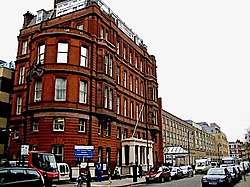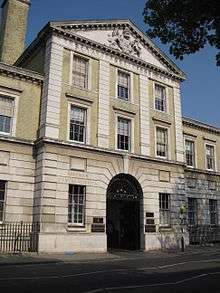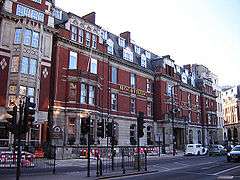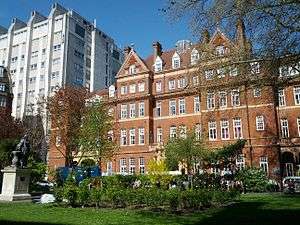UCL Medical School
UCL Medical School is the medical school of University College London (UCL) and is located in London, United Kingdom. The School provides a wide range of undergraduate and postgraduate medical education programmes and also has a medical education research unit and an education consultancy unit.
| Type | Medical school |
|---|---|
| Established | 1746 (Middlesex Hospital Medical School) 1834 (University College Hospital Medical School) 1874 (London School of Medicine for Women, later The Royal Free Hospital School of Medicine) 1987 (University College and Middlesex School of Medicine) 1998 (Royal Free and University College Medical School) 2008 (UCL Medical School) |
| Dean | Professor David Lomas |
| Director | Professor Deborah Gill |
| Location | , |
| Website | UCL Medical School |
UCL has offered education in medicine since 1834. The currently configured and titled medical school was established in 2008 following mergers between UCLH Medical School and the medical school of the Middlesex Hospital (in 1987) and The Royal Free Hospital Medical School (in 1998).
The School's clinical teaching is primarily conducted at University College Hospital, The Royal Free Hospital and the Whittington Hospital, with other associated teaching hospitals including the Eastman Dental Hospital, Great Ormond Street Hospital, Moorfields Eye Hospital, the National Hospital for Neurology and Neurosurgery and the Royal National Throat, Nose and Ear Hospital, Royal National Orthopaedic Hospital and Luton and Dunstable University Hospital.
The School is currently ranked 8th in the world by the QS World University Rankings 2020.
History
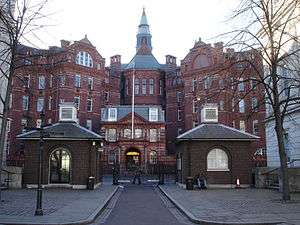
UCL Medical School formed over a number of years from the merger of a number of institutions:[1]
- The Middlesex Hospital opened in Fitzrovia in 1745 and was training doctors from 1746 onwards, when students were 'walking the wards'.
- University College Hospital opened in 1834 as the North London Hospital, with the purpose of providing the then newly opened University College London with a hospital to train medical students after refusal by the governors of the Middlesex Hospital to share its facilities with UCL.
Middlesex Hospital and University College Hospital merged their medical schools in 1987 to form University College & Middlesex School of Medicine (UCMSM).
- The London School of Medicine for Women was established in 1874 by Sophia Jex-Blake, as the first medical school in Britain to train women. In 1877 The Royal Free Hospital agreed to allow students from LSMW to complete their clinical studies there and by 1896 was renamed The London Royal Free Hospital School of Medicine for Women and became part of the University of London.
In 1998 The Royal Free & University College Medical School (RFUCMS) was formed from the merger of the two medical schools. On 1 October 2008, it was officially renamed UCL Medical School.[2]
In appreciation of the historic beginnings of UCL Medical School, its student society has retained the name "RUMS" (Royal Free, University College and Middlesex Medical Students Society) and runs clubs and societies within University College London Union.[3]
Teaching
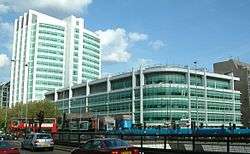
The medical school is one of the largest in the country with a yearly intake of 330 students.[4] Undergraduate teaching is spread across three campuses based in Bloomsbury (including University College Hospital), at Archway (including Whittington Hospital) and in Hampstead (including the Royal Free Hospital).[5]
Teaching takes place in arguably some of the best clinical sites in the country including: Great Ormond Street Hospital, The National Hospital for Neurology and Neurosurgery (Queen's Square), Moorfields Eye Hospital, The Heart Hospital, The Royal National Orthopaedic Hospital and the Royal National Throat, Nose and Ear Hospital.
The school is not only widely regarded as one of the best medical schools in the country (frequently ranked between number 1–5 in the country), but also one of the best in the world; being ranked consistently in the top 10.
Course
The course in medicine at UCL leads to the award of the MB BS and BSc (Hons) degrees and is a six-year integrated programme: Years 1 and 2 Fundamentals of Clinical Science; Year 3 Integrated BSc degree; Year 4 Integrated Clinical Care; Year 5 The Life Cycle and Specialist Practice and Year 6 Preparation for Practice.[6]
Admission
Admission to the medical school, in common with all 32 medical schools in the UK, is extremely competitive. The medical school receives approximately 2,500 applications yearly (over 2700 for 2018 entry) of which up to 700 applicants are selected for interview. Approximately 450 offers are given for 322 places. Prospective students must apply through the Universities and Colleges Admissions Service (UCAS).[7]
As of 2015 entry, conditional offers for entry include grades A*AA at A-level, to include at least Chemistry and Biology, and an additional pass at AS-level. The International Baccalaureate (Full Diploma), although less common, is also an acceptable entry qualification. The course is also open to graduates with a minimum of a 2:1 required. Additionally, applicants must sit an entrance exam, the BioMedical Admissions Test (BMAT) which is used alongside the rest of the UCAS application to determine selection for interview.[8][9][10]
Associated hospitals and research institutes
Hospitals
UCL Medical School is associated with the following hospitals:
Research institutes
UCL Medical School is associated with the following research institutes:
- UCL Cancer Institute
- UCL Ear Institute
- UCL Eastman Dental Institute
- UCL Institute of Child Health
- UCL Institute of Neurology
- UCL Institute of Nuclear Medicine
- UCL Institute of Ophthalmology
- UCL Institute of Orthopaedics and Musculoskeletal Science
- UCL Wolfson Institute for Biomedical Research at UCL
- National Institute for Medical Research (NIMR)
UCL Medical School forms part of the UCL Faculty of Medical Sciences, together with the Division of Medicine, Division of Infection and Immunity, Division of Surgery and Interventional Science, UCL Cancer Institute, UCL Eastman Dental Institute and UCL Wolfson Institute. UCL Faculty of Medical Sciences is one of four Faculties within the UCL School of Life and Medical Sciences.
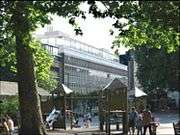 The UCL Institute of Child Health on Guilford Street in Bloomsbury
The UCL Institute of Child Health on Guilford Street in Bloomsbury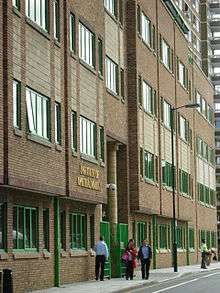
Rankings
In the 2014/15, QS World University Rankings by Subject UCL was ranked 10th in the world (and 5th in Europe) for Medicine.[11]
In the 2014 Academic Ranking of World Universities subject tables, UCL was ranked 17th in the world (and 4th in Europe) for Clinical Medicine and Pharmacy.[12]
In domestic rankings for Medicine, UCL is ranked 2nd in the 2015 Complete University Guide,[13] 4th in the 2014 Guardian University Guide,[14] and 4th in the 2014 Times and Sunday Times League Table.[15]
Student societies
All students at UCL Medical School are also members of The Royal Free, University College and Middlesex Medical Students’ Association (RUMS MSA) - a student-led organisation that is independent of UCL Medical School.[16] RUMS has a proud and illustrious past having been formed in the wake of the merger between the three constituent medical schools in 1998. Its predecessor, The Middlesex Hospital Medical Society is reportedly the oldest student society in England having been formed in 1774.[17] Since its formation in 1998 RUMS (RUMS) has gone from strength to strength and now provides social events, sports teams, societies, welfare services and representation to the 1200 or so medical students at UCL Medical School.
In 2011, UCLU Medical Society was established separate from RUMS MSA to provide careers advice and peer teaching for medical students, as well as special interest events. These events can be centrally organised or by various subdivisions or "sections" within the society ranging from those devoted to medical specialities such as Paediatrics or General Practice to Medical Leadership & Management and Global Health.[18][19] Since 2012, one of the most popular sections of UCLU Medical Society has been UCLU Med Soc Education, which provides peer-to-peer and near-peer teaching events, run by medical students for other medical students. The novelty of this section is their collaboration with the medical school faculty to ensure quality and validity of the student-produced material and student-led teaching on offer.
Notable alumni
Notable alumni of UCL Medical School and its predecessor institutions include:
- Emmanuel Quaye Archampong, Emeritus Professor of Surgery at the University of Ghana
- Josephine Barnes, championed the cause of women's health throughout her illustrious career. First female president of the British Medical Association in 1979
- Diana Beck, first woman to be appointed to the honorary staff of the Middlesex Hospital, in 1947, and is thought to have been the first female neurosurgeon in the world
- Charles Bolton, appointed Commander of the Order of the British Empire (CBE)
- John Bowlby, pioneer of attachment theory
- Michael Brown, former Physician to the Queen
- George Budd, physician after who Budd-Chiari Syndrome is named after
- Walter Carr
- G. Marius Clore FRS, Member of the United States National Academy of Sciences, molecular biophysicist and structural biologist known for foundational work in three-dimensional protein and nucleic acid structure determination by multidimensional NMR spectroscopy.[20]
- Archie Cochrane, physician who pioneered randomised controlled studies and after whom The Cochrane Library is named.
- Leslie Collier, virologist who helped to create the first heat stable smallpox vaccine key in the eventual eradication of the disease.[21]
- Mildred Creak, child psychiatrist
- Jane Dacre, former President of the Royal College of Physicians (2014–2018), only the third female President in its nearly 500-year history[22][23]
- Deborah Doniach, leading expert on auto-immune diseases[24]
- Jeremy Farrar, director of the Wellcome Trust
- William Henry Flower, comparative anatomist and 2nd director of the Natural History Museum.
- Eva Frommer. Fellow of the Royal College of Psychiatrists, child psychiatrist and pioneer of arts therapies in hospital, for children.
- Alfred Baring Garrod, physician who linked raised urea levels in the blood as the cause of gout
- Clare Gerada, former Chair of the Royal College of General Practitioners (2010–13), the first female Chair for 50 years[25][26][27]
- Ben Goldacre, academic and science writer
- Michael Goldacre, Professor of Public Health, University of Oxford
- Wendy Greengross(1925–2012), general practitioner and broadcaster[28]
- Gillian Hanson, intensive care specialist
- Anita Harding, neurologist who co-authored the first paper which identified pathogenic mitochondrial DNA mutation in human disease (in Kearn-Sayre syndrome).
- Gwen Hilton, A major figure in the campaign to allow women students to be admitted to the UCH Medical School in 1920, went on to establish the first radiotherapy department at University College Hospital
- Victor Horsley, pioneering Neurosurgeon
- Allan Octavian Hume, one of the founders of the Indian National Congress[29]
- Donald Jeffries, leading expert on HIV[30]
- Christian Jessen, television presenter
- Nick Lane, biochemist and writer
- Thomas Lewis, cardiologist who was appointed CBE and also knighted.
- Joseph Lister pioneer of anti-septic surgery, who after receiving a bachelor's degree from UCL, trained at UCLH winning several gold medals during his time there[31] Kalman Mann, 8th director general of Hadassah Medical Organization[32]
- Hugh Llewellyn Glyn Hughes, CBE, DSO & 2 bars, MC, MRCS. Brigadier Royal Army Medical Corps
- Henry Marsh, neurosurgeon who was appointed CBE.[33]
- Arthur Martin-Leake, soldier who received both the Victoria Cross and the Bar.
- Clare Marx, first female president elected at the Royal College of Surgeons of England (2014-incumbent)
- Ramani Moonesinghe, consultant in Anaesthetics and Critical Care Medicine and Associate National Clinical Director for Elective Care for NHS England
- Michael Mosley, television journalist and presenter
- Catherine Neill, paediatric cardiologist at Johns Hopkins Hospital
- Hugh Owen Thomas, father of orthopaedic surgery in Britain
- Max Pemberton, medical doctor and journalist
- Philip Randle, the Randle cycle is named after him
- Bernard Ribeiro, Baron Ribeiro, former President of the Royal College of Surgeons of England (2005–08). Life peer in House of Lords since 2010.
- Sydney Ringer, a British clinician, physiologist and pharmacologist, best known for inventing Ringer's solution.
- William Scoresby Routledge, ethnographer
- Rosemary Rue
- Mary Patricia Shepherd, thoracic surgeon
- Elizabeth Joan Stokes, clinical bacteriologist
- Edward Treacher Collins, ophthalmologist and first described Treacher Collins Syndrome
- Dawson Turner, rugby union international who represented England (1871–75).
- Margaret Turner-Warwick, first female president elected at the Royal College of Physicians (1989-1992)
- Sir John Williams, 1st Baronet, of the City of London, gynaecologist and obstetrician to Queen Victoria
- Albertine Winner, physician and medical administrator
- R. A. Young, physician and expert on tuberculosis
References
- "History of UCL Medical School". UCL. Retrieved 12 April 2014.
- "Royal Free Association - Origins". Royal Free. Archived from the original on 13 April 2014. Retrieved 12 April 2014.
- "RUMS Medics". RUMS. Retrieved 12 April 2014.
- "Undergraduate Programmes". UCL. Retrieved 12 April 2014.
- "Campuses". UCL. Retrieved 12 April 2014.
- "MBBS Programme". UCL Medical School. 7 December 2017.
- "Candidate Selection & Interview". UCL. Retrieved 12 April 2014.
- "MBBS Academic Entry Requirements for 2015 Entry" (PDF). UCL. Retrieved 12 April 2014.
- "New test for medics". Times Higher Education. 16 December 2005. Retrieved 1 March 2014.
- "MBBS Entry Requirements". UCL. Retrieved 12 April 2014.
- "QS World University Rankings by Subject 2014 - Medicine". QS Quacquarelli Symonds Limited. Retrieved 16 September 2014.
- "Academic Ranking of World Universities in Clinical Medicine and Pharmacy - 2014". Shanghai Ranking Consultancy. Retrieved 16 September 2014.
- "University Subject Tables 2015 - Medicine". The Complete University Guide. Retrieved 13 May 2014.
- "University guide 2014: league table for medicine". The Guardian. Retrieved 24 September 2013.
- "University Guide 2014 - Medicine". Times Newspapers. Retrieved 24 September 2013.
- "RUMS Medics". RUMS. Retrieved 12 April 2014.
- "The Oldest Medical Societies in Great Britain" (PDF).
- "UCLU Medical Society". UCLU. Retrieved 12 April 2014.
- "About us". UCL Medical Society. Retrieved 12 April 2014.
- "New Members and Foreign Associates of the National Academy of Sciences: G. Marius Clore, Gregory C. Fu, Sir J. Fraser Stoddart, Ei-ichi Negishi". Angewandte Chemie International Edition. 53: 6598. 2014. doi:10.1002/anie.201405510.
- "Professor Leslie Collier". The Daily Telegraph. Telegraph Media Group. 22 March 2011. Retrieved 25 November 2014.
- "Professor Jane Dacre is elected president of the Royal College of Physicians". Royal College of Physicians. Retrieved 27 April 2014.
- "Prof Jane Dacre". University College London Institutional Research Information Service. Retrieved 27 April 2014.
- "Deborah Doniach". The Guardian. Guardian Media Group. 15 January 2004. Retrieved 18 November 2014.
- "Opponent of NHS reform driven by grim memories of 60s". The Guardian. 19 November 2010. Retrieved 4 August 2014.
- "Why are clinical commissioning groups dominated by men?". The Guardian. 21 March 2013. Retrieved 4 August 2014.
- "New Chair-elect for RCGP". Royal College of General Practitioners. 10 May 2013. Retrieved 4 August 2014.
- Bayfield, Tony. "Greengross [married name Katz, later Kates], Wendy Elsa (1925–2012)". ONDB. OUP. Retrieved 26 November 2017.
- Olsom, James Stuart; Shadle, Robert (1996). Historical Dictionary of the British Empire. Greenwood Publishing Group. p. 539. ISBN 978-0-313-29366-5.
- "Donald Jeffries obituary". The Telegraph. 27 December 2011. Retrieved 24 June 2012.
- Lindsey Fitzharris (2017). The Butchering Art: Joseph Lister's Quest to Transform the Grisly World of Victorian Medicine. New York: Scientific American: Farrar, Straus, and Giroux. ISBN 9780374117290
- Godfrey, Simon (2009). "Munk's Roll: Kalman Jacob Mann". Royal College of Physicians. Retrieved 22 April 2014.
- Boersma, Maxine (9 October 2014). "Neurosurgeon Henry Marsh on care and capitalism". Financial Times. Retrieved 9 December 2015.
Sources
- University College Hospital and Its Medical School: A History by W R Merrington (1976) ISBN 0-434-46500-3
External links
- UCL Medical School official website
- Royal Free, University College and Middlesex Medical Students Society website
- UCL Medical School Clinical Assessment Centre website
- UCL Institute of Orthopaedics and Musculoskeletal Science
- How British Women Became Doctors: The Story of the Royal Free Hospital and its Medical School - Neil McIntyre/Wenrowave Press 2014
